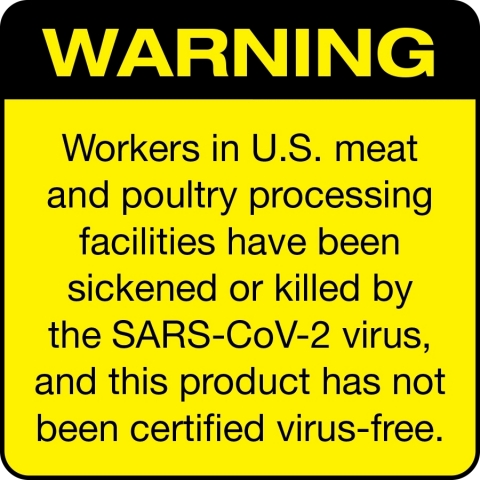WASHINGTON--(BUSINESS WIRE)--The Physicians Committee for Responsible Medicine—a nonprofit with more than 12,000 doctor members—has filed an Emergency Petition with the U.S. Department of Agriculture requiring that slaughterhouses test meat and poultry for SARS-CoV-2 prior to making it available for sale and requiring groceries to warn consumers of the potential presence of SARS-CoV-2 on meat and poultry products.
Since the beginning of the COVID-19 pandemic, thousands of slaughterhouse workers have been infected with SARS-CoV-2. As of May 14, there were at least 14,259 infections and 59 deaths among U.S. slaughterhouse workers, according to the Food & Environment Reporting Network.
Slaughterhouses have been central points of viral spread in humans. In South Dakota, more than half the cases of COVID-19 statewide occurred in workers at the Smithfield plant in Sioux Falls. Workers have expressed grave concerns for their personal safety, due to the frequent transmission of the virus within slaughterhouses.
The petition, filed by Mark Kennedy, vice president for Legal Affairs at the Physicians Committee, says, “Because these workers, who may be asymptomatic viral carriers, directly handle meat and poultry products, and because SARS-CoV-2 is easily airborne, remaining detectable for 30 minutes or more in air samples, transmission of the virus to the products they handle is likely.” Researchers have not specifically tested the temperature at which meat and poultry products would have to be heated to kill SARS-CoV-2.
U.S. slaughterhouses remain under intense pressure to produce meat and poultry products, despite risks to workers and the public. Despite this risk, no U.S. slaughterhouse tests its meat and poultry products for the presence of the virus.
To speak with Mark Kennedy or another Physicians Committee expert, please contact Leslie Raabe at 202-527-7319.
Founded in 1985, the Physicians Committee for Responsible Medicine is a nonprofit health organization that promotes preventive medicine, conducts clinical research, and encourages higher standards for ethics and effectiveness in research and medical training.

